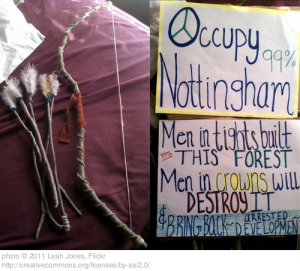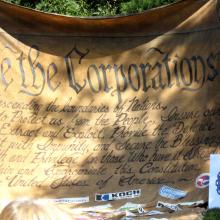Labor Unions
Class Over Race
In Trash: A Poor White Journey, chaplain Cedar Monroe explores the complex dynamics of being poor and white in the U.S. Grounded in liberation theology, the author ultimately calls communities to embrace multiracial solidarity and reject “the empty promises of white supremacy.” Broadleaf
WHY THE RECENT surge in union activity? The nationwide shortage of workers is one factor, to be sure, as is the COVID pandemic. But another contagion might be even more important: Hope. “You see it most clearly with the Starbucks campaign where they won those initial two victories, and it was like a switch going off for people: ‘We can do this!’” labor attorney Alex van Schaick told Sojourners. “There was a contagion effect, in a positive sense. Hope is contagious — I think that’s really true.” Clayton Sinyai, executive director of the Catholic Labor Network, agreed that the confidence and resolve of workers is making a dramatic difference. “It seemed for a long time that employers had gotten so skilled at manipulating the union election process that a lot of people had become very discouraged about trying to form unions,” Sinyai said. “Now we’re seeing a generation of workers who are not taking no for an answer.”
THE LATEST FAD among some conservative pundits and propagandists is to bash corporate executives who use their positions to promote “politically correct” causes. They call it “corporate wokeness,” and they see it everywhere. However, this is not a new phenomenon.
In 1971, in the backwash of the 1960s, America was very much a country in crisis. Large swaths of our inner cities still bore scars left by the uprisings that followed the assassination of Rev. Martin Luther King Jr. A president elected on a promise to end the Vietnam War was widening it instead. Coca-Cola had the answer to all that trouble and strife. That year, the soda company assembled 500 young people of varied races and nationalities on a hilltop and filmed them singing, “I’d like to teach the world to sing in perfect harmony.” So “corporate wokeness” was born.
Twenty-nine years later, Coca-Cola paid millions of dollars to settle a federal court case accusing it of a historical pattern of systematically underpaying and otherwise discriminating against its Black employees.
In spring 2020, just a few days after a police officer murdered George Floyd, JPMorgan Chase CEO Jamie Dimon and Brian Lamb, the company’s global head of diversity and inclusion, issued a statement that “we are watching, listening and want every single one of you to know we are committed to fighting against racism and discrimination wherever and however it exists.” A week later, Dimon was photographed, with some bank employees, down on one knee in the Colin Kaepernick pose, presumably in an attempted display of solidarity.
MOST OF US KNOW that there is something drastically wrong with the American economy. In 2017, the richest 10 percent of the population owned 77 percent of the nation’s wealth and the 20 richest Americans had more wealth than the entire bottom half of the American population. What is worse is that the new tax bill passed by President Trump and the Republican Congress will increase this imbalance. By 2027, according to the Tax Policy Center, 90 percent of its benefits will go to the richest of Americans. Because the changes will be incremental, they are not likely to be noticed by the vast majority of citizens until it is too late.
Financing these tax breaks for the rich is being accomplished in three ways. First, there will be cuts in benefits for the middle class, which that will mean less money for higher education, medical programs, and social security. Second, there will be dramatic cuts made to the programs that have heretofore provided a safety net for the poor, including cuts to the food stamps program, Medicaid, and housing subsidies. Third, there will be a huge increase in the national debt.
t’s also one of the most divisive political issues on the Hill right now. Here’s why: The notion of "fast tracking" trade deals with almost no congressional oversight has led to the creation of odd alliances — putting the Democrats and Tea Party in one camp (against), and the Republicans and Obama Administration (for) in another. Pro-business Republicans are long time supporters of free trade, while members of the Tea Party are against most anything that would allow the President to usurp legislative authority. As for Democrats, they argue that the TPP would allow multinational corporations to undermine labor safeguards, civil rights, environmental protection and healthcare, and derail urgent efforts at fighting climate change. Organizations typically aligned with President Obama are against him here: labor unions, environmental groups, and even traditionally non-political groups have fought hard against Fast Track and the TPP.
Indeed, the potential harm from the trade deal seems to leave few interest groups untouched. To provide just a few examples, Doctors Without Borders has called the TPP the "worst trade deal ever," claiming that it will cause millions to lose access to life-saving medicines; left-leaning Global Exchange has pointed to the increasing number of sweatshops such a framework would lead to; and the digital rights organization Electronic Frontier Foundation has expressed its belief that the TPP would put overly restrictive controls on the internet. And we’ve already seen our political leaders weaken standards for protection against human trafficking and child labor should the trade deal move forward.
These are all compelling arguments, and they are ones faith groups are making as well.
FAITH-ROOTED Organizing: Mobilizing the Church in Service to the World outlines a theological cartography of social change. In this critical intervention, Alexia Salvatierra and Peter Heltzel reimagine—and as a necessary consequence, rechart—the landscape of vision, action, and strategic planning needed for social change.
Full disclosure: I have attended several trainings conducted by the co-authors. Indeed, the dual authorship of the text is a principal strength. Faith-Rooted Organizing blends the voice of an evangelical-activist theologian in Heltzel with the homespun profundity of a seasoned pastor and campaign organizer in Salvatierra. The authors delight readers with complementary writing styles: Heltzel speaks through theological propositions, interpolated intermittently with jazz references and theological punch lines; Salvatierra communicates through proverbs, organizing anecdotes, poignant biblical passages, and narrative side notes.
The result is a well-argued and accessible text that should resonate from the seminary to the sanctuary. Their driving thesis is that faith communities, especially Christian ones, should organize for social change in a way that is rooted and guided by the stories, symbols, sayings, and scriptures of our faith. Faith-Rooted Organizing functions as an instruction manual on effective advocacy while providing a theological rationale and vocabulary for a vocation marked by tremendous victories and colossal failures, breakthrough partnerships and fragmented coalitions, glimpses of beloved community and portraits of democracy stillborn.
When the U.S. is negotiating a mammoth, powerful international trade agreement, what do negotiators do when faced with tradeoffs between commercial interests in the U.S. and other U.S. values—such as human rights, preserving the planet we all have to live on, and helping the poor?
That’s the question I asked Carol Guthrie, Assistant U.S. Trade Representative for Public and Media Affairs, last weekend at the Leesburg, Va., resort where the next big thing in trade negotiations—the Trans Pacific Partnership (TPP), basically NAFTA for the Pacific Rim—was taking shape in its 14th round of negotiations.
Many parts of civil society, from the Sierra Club to the Columban Fathers, argue the TPP would have profound negative effects on the environment, public health, human rights, internet freedom, and the global poor, among other things. A number of civil society groups showed last Sunday in Leesburg, where they could sign up for a chance to speak to negotiators—but not, unlike around 600 mostly-corporate insiders, to see the actual text being negotiated. (Members of Congress reportedly are allowed to see the text—but, unlike the insiders, not to download a copy, take notes, or bring an expert staffer with them).
Bishop Kevin Dowling, the Catholic bishop of Rustenburg, South Africa, is co-president with Marie Dennis of Pax Christi International, representing the global Catholic peace movement. The massacre by South African police of 44 striking miners at British-owned Lonmin's platinum mine in Marikana is in Bishop Dowling's diocese. He is an active leader in the Catholic nonviolence movement.
Agenzia Fides reports from Johannesburg:
"Maybe tomorrow, August 29th, there will be the signing of an agreement between the unions and the managers of the platinum mine in Marikana (North West Province, in South Africa). This was reported to Fides Agency by His Exc. Mgr. Kevin Dowling, Bishop of Rustenburg.
"We hope the efforts of the government to sign a reconciliation agreement tomorrow among four trade union organizations and the management of the mine is successful," said Mgr. Dowling.
"Negotiations are still in progress and relate in particular to an increase in wages. Tension is still very high and workers who want to return to work are blocked with threats by strikers," said the Bishop, who is participating in efforts to negotiate with the other Christian leaders who are part of the South African Council of Churches.
On August 16, a union protest in the Marikana mine degenerated into violence: the police shot and killed 34 miners. In the fighting a total of 44 people died. In a statement sent to Fides Agency the Southern African Catholic Bishops'Conference (SACBC) called for a thorough investigation into the massacre and condemned the violence.
Read the rest here.
President’s Obama’s delay in approving the Keystone XL Pipeline is a victory for the movement to stop it, for God’s earth, for the possibility of reversing climate change, and for saving the integrity of this administration.
A “No” to pipeline approval wasn’t really politically likely, with the likelihood of attacks on Obama by the Republicans and the labor movement of sacrificing jobs during an election year — even though the pipeline offers temporary and bad jobs.
The environmental movement is part of the Democratic President’s base, but so is labor and they are both more numerous and more effectively organized to help in presidential races.
So this delay is a victory for the possible future of a clean energy economy, which would produce many more and better jobs, while making a cleaner and more sustainable economy possible.

With the opening of the G20 Summit in Cannes, France today, an idea that's been around for awhile is in the news again and gaining more attention as a result of the #OWS movement: The so-called "Robin Hood tax," a minimal tax on all financial transactions with the resulting revenue dedicated to anti-poverty programs....Archbishop of Canterbury Rowan Williams, in his response to the occupation of St. Paul's Cathedral in London, endorsed the Vatican proposals. Williams observed that "people are frustrated beyond measure at what they see as the disastrous effects of global capitalism," and urged a full debate on "a Financial Transaction Tax
While it's generally not worth spilling any ink over Glenn Beck, his recent attacks on churches that preach "social justice" has rightly earned the condemnation of diverse faith leaders
Labor Day weekend is often a slow time for congregations. Members are attending family gatherings. Parents are getting children ready for school. Neglected summer projects are undertaken or (like my garden) abandoned until next summer. Aside from the occasional Labor Day parade, few Labor Day activities seem to have anything to do with honoring labor. Labor Day weekend nonetheless offers congregations an opportunity to lift up the values of work and reflect on our religious [...]





